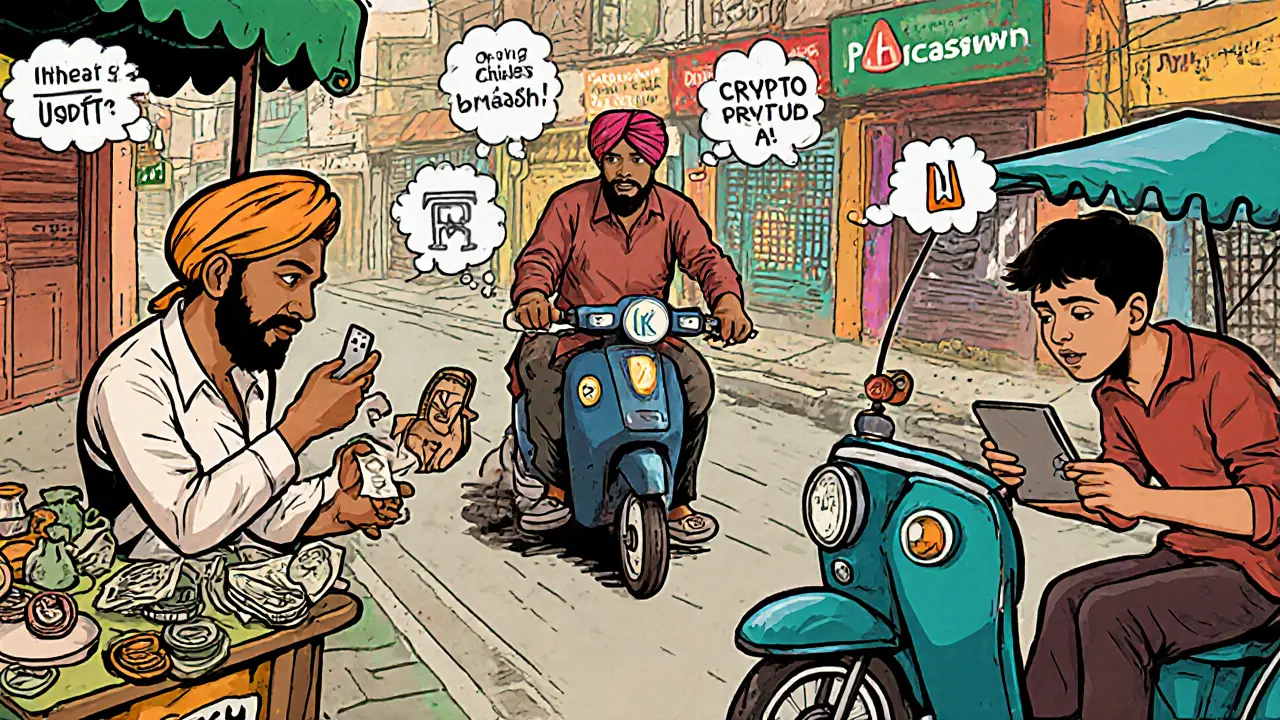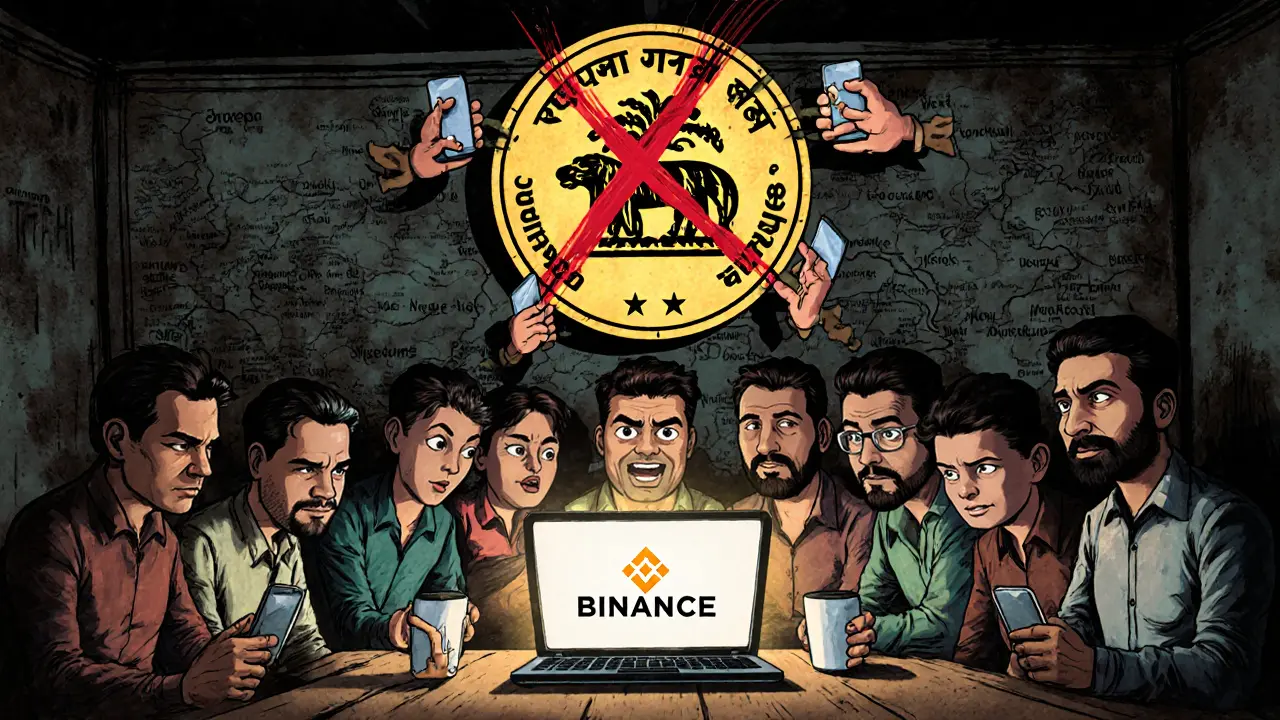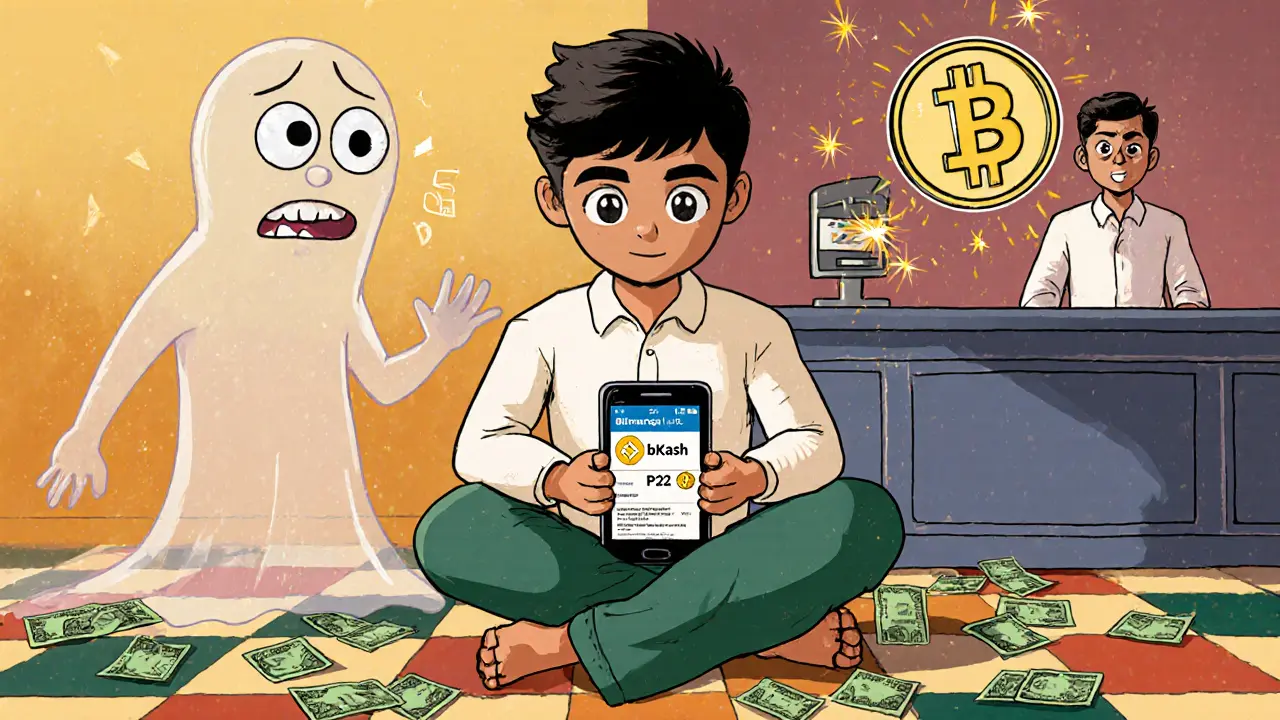Remittance Cost Calculator
How Much Money Are You Sending?
Enter an amount and select a method to see your potential savings.
How This Works
Traditional remittance services charge 3-8% fees. P2P crypto trading through Binance P2P can save you up to 7.5% in fees. For example, sending $1,000 via Western Union would cost you $30-$80, while using P2P crypto would cost about $5-$10.
Warning: Crypto trading in Bangladesh is illegal under the Foreign Exchange Regulation Act. This calculator is for informational purposes only. You assume all risk of loss or legal consequences.
In Bangladesh, buying and selling crypto isn’t legal. The central bank, Bangladesh Bank, has said since 2014 that any trade involving taka and cryptocurrency breaks the Foreign Exchange Regulation Act. Yet, over 3.5 million people still trade crypto every month. How? They’re using peer-to-peer (P2P) methods that skip banks entirely and rely on mobile money apps like bKash and Nagad.
Why P2P Crypto Is Everywhere in Bangladesh
You won’t find crypto ATMs or licensed exchanges in Dhaka. But you’ll find students, overseas workers, and small business owners trading Bitcoin, USDT, and Ethereum through apps. The reason isn’t speculation-it’s survival. Bangladesh received $21.5 billion in remittances in 2022. Traditional services like Western Union charge 3-8% in fees. On Binance P2P, traders pay as little as 0.5% to send money to family in the UAE, the UK, or the US. The system works because mobile money is everywhere. bKash has 72.5 million active users. Nagad has 45 million. These apps are faster, cheaper, and more trusted than banks for everyday transactions. Crypto traders use them to send and receive taka instantly-no bank account needed.How P2P Trading Actually Works
Most traders use Binance’s P2P platform. Here’s how it works step by step:- Create a Binance account and complete KYC (ID verification). Even though it’s illegal, Binance requires this for trades over $1,000.
- Go to the P2P section and choose “Buy USDT” or “Sell USDT.”
- Filter for sellers who accept bKash or Nagad. Over 90% of trades in Bangladesh use one of these two.
- When you find a match, you pay the seller via bKash using their QR code. The money goes directly to their phone wallet.
- Once Binance sees the payment (usually within 5 minutes), it releases the crypto from escrow to your wallet.
The Three Main Ways People Trade Crypto in Bangladesh
There are three real methods people use, and they’re very different:- Exchange-based P2P (Binance, Bybit): Used by 73% of traders. Safe, escrow-protected, and fast. Binance handles 1.2 million monthly trades from Bangladesh. Spreads are 1.2-3.5% above market price.
- Informal agents: Used by 19%. These are people who run crypto deals from mobile shops, tea stalls, or even homes. They take cash or mobile payments and hand over crypto in person. Spreads are higher-4-8%-but they’re the only option for people without smartphones or internet. There are over 12,000 registered agents in Dhaka alone.
- Decentralized exchanges (DEX) like PancakeSwap: Used by only 8%. You need a MetaMask wallet, some BNB for gas fees, and technical know-how. No KYC. No escrow. No support. But it’s anonymous. Transactions cost about 0.8%, and you can trade any token on Binance Smart Chain.

What Goes Wrong-and How People Fix It
It’s not all smooth. About 63% of negative reports come from agent scams. A common trick: someone pays ৳250,000 via bKash, sends the screenshot to the agent, and gets the crypto. Then the agent reverses the bKash payment using a fake refund link. The crypto is gone. The money is gone. And there’s no way to reverse it. Binance P2P avoids this because the platform holds the crypto until payment clears. But even Binance has problems. Mobile banking apps like Nagad often block transactions over ৳50,000. Users report failed payments during Eid holidays when the system crashes. Processing times jump from 8 minutes to 47 minutes. Traders have learned tricks:- Use “Send Money” instead of “Cash In” on bKash. The latter triggers fraud alerts.
- Trade in smaller amounts-under ৳100,000-to avoid system blocks.
- Join Telegram groups like “Crypto BD Guide,” which has 47,000 members and keeps a live blacklist of 217 known scammers.
- Always use two-factor authentication (98% of users do). But only 37% use multi-signature wallets because they’re too complicated.
Who’s Using This-and Why
The typical crypto trader in Bangladesh is:- Aged 18-35
- Lives in Dhaka, Chittagong, or Sylhet
- Has a family member working abroad
- Uses a smartphone (Android 7.0 or higher)
- Has used bKash or Nagad for years
The Legal Trap
Here’s the real danger: you’re breaking the law. In 2022, 17 traders in Dhaka were arrested under Section 411 of the Penal Code-for “possessing stolen property.” The government argued that crypto isn’t legal tender, so holding it is like holding stolen cash. Bangladesh Bank issued a warning in February 2024: “All cryptocurrency transactions violate foreign exchange regulations.” They’ve frozen 1,842 bank and mobile money accounts since October 2024. In January 2025, police raided 87 crypto trading hubs and seized equipment worth ৳32 million. There’s no legal protection. If you get scammed on an agent deal, the police won’t help. If Binance freezes your account, you have no recourse. If your bKash payment is reversed, you lose everything.
What’s Next? The Government’s Secret Plan
Despite the crackdown, the government isn’t ignoring crypto. In 2023, they launched a National Blockchain Strategy. Bangladesh Bank has been testing a central bank digital currency (CBDC) since 2022. A 12-member Crypto Asset Task Force was formed in February 2025 to recommend regulations by December 2025. Experts think two things will happen:- CBDC will be launched-probably by 2026. It’ll look like a digital taka, but controlled by the bank.
- P2P crypto trading will stay illegal-but enforcement may slow down. Why? Because the system works. It’s too big to shut down.
How to Start Safely (If You Must)
If you’re thinking about trying P2P crypto in Bangladesh, here’s what you need to know:- Start with Binance. It’s the only platform with reliable escrow and Bengali support.
- Use bKash. It’s the most reliable. Avoid Nagad for large amounts-it blocks over ৳50,000 often.
- Trade under ৳100,000 to avoid fraud alerts.
- Never meet agents in person. If you do, bring someone with you.
- Always use 2FA. Never share your recovery phrase.
- Join “Crypto BD Guide” on Telegram. Check agent ratings before trading.
- Don’t invest more than you can afford to lose. There’s no safety net.
Final Reality Check
P2P crypto in Bangladesh isn’t a trend. It’s a workaround. A digital underground economy built on mobile money, trust, and necessity. It’s not legal. It’s not safe. But for millions, it’s the only way to send money home, protect savings, or buy goods from abroad. The government may ban it. The banks may block it. But as long as remittances keep flowing and the taka keeps losing value, people will find a way.Just remember: no one is coming to save you if you get scammed. You’re on your own.
Is P2P crypto trading legal in Bangladesh?
No, it’s not legal. Bangladesh Bank has banned cryptocurrency transactions since 2014 under the Foreign Exchange Regulation Act. Trading crypto using taka violates this law. While people still do it, there is no legal protection if you’re scammed, arrested, or have your funds frozen.
Can I use bKash or Nagad to buy crypto?
Yes, and most traders do. bKash is used in 61% of P2P trades on Binance, and Nagad is used in 29%. You send money directly to the seller’s phone wallet, and they release crypto once payment is confirmed. But be careful-mobile apps often block large transfers, and fraudsters can reverse payments after you’ve received crypto.
Which platform is best for P2P crypto in Bangladesh?
Binance is the best for most people. It handles over 1.2 million monthly trades from Bangladesh, offers escrow protection, supports bKash and Nagad, and has Bengali customer service. Bybit is good for margin trading, and KuCoin offers more altcoins, but neither has the same volume or reliability as Binance.
Why do people use USDT instead of Bitcoin?
USDT (Tether) is pegged to the US dollar, so it doesn’t swing in value like Bitcoin. In Bangladesh, where the taka loses value each year, people use USDT to protect their savings. It’s also easier to trade in small amounts and faster to convert back to taka. Over 72% of all P2P trades in Bangladesh involve USDT.
How can I avoid getting scammed on P2P crypto?
Use only Binance P2P or trusted agents with verified histories. Never pay before receiving crypto. Always use 2FA. Never share your wallet seed phrase. Check the “Crypto BD Guide” Telegram channel for blacklisted scammers. Trade under ৳100,000 to avoid mobile banking blocks. If you’re using an agent, never pay in cash without a witness.
Will Bangladesh ban crypto completely?
It’s unlikely. While the government cracks down on trading, it’s also building a central bank digital currency (CBDC). This suggests they want control over digital money-not to eliminate it. Experts believe P2P crypto will remain underground until the government creates a legal framework, likely by 2027. For now, enforcement is selective, not total.


Natalie Nanee
November 6, 2025 AT 20:30This is exactly why regulation fails. People don't stop using tools that solve real problems just because some bureaucrat says so. The fact that 3.5 million people are doing this monthly proves the system works-better than the banks ever did.
Angie McRoberts
November 7, 2025 AT 03:58So… the government bans crypto, but the entire remittance economy runs on it? Classic. They’re not fighting technology-they’re fighting human survival. And they’re losing.
Chris Hollis
November 7, 2025 AT 18:51Binance P2P is the only reason this works. Escrow saves lives. Agents are a death trap. 63% scam rate? That’s not a market, that’s a warzone.
Diana Smarandache
November 7, 2025 AT 22:00Let me be clear: this is not innovation. This is a lawless black market masquerading as financial inclusion. The state has a duty to protect its citizens from unregulated financial chaos. This is not empowerment-it’s exploitation.
Allison Doumith
November 9, 2025 AT 15:48Isn’t it beautiful how necessity becomes the mother of rebellion? The taka is collapsing, remittances are lifelines, and the system refuses to adapt-so people build their own. No permission needed. No approval required. Just QR codes and trust. That’s the real revolution.
We call it illegal. But what’s more illegal? Trading crypto or letting families starve because Western Union takes 8%?
The state doesn’t see this as finance. They see it as defiance. And defiance, when it’s quiet and widespread, is the most dangerous thing of all.
Scot Henry
November 10, 2025 AT 09:25Biggest takeaway: use bKash, not Nagad. And never go over 100k. I learned that the hard way. Lost 80k in one day. Now I stick to 50k max. 2FA is non-negotiable. Seriously.
Sunidhi Arakere
November 12, 2025 AT 05:12Very interesting. In India, we also use UPI for small remittances. But we don’t have crypto. Maybe one day.
Vivian Efthimiopoulou
November 13, 2025 AT 05:58There is a profound philosophical truth here: when institutions fail to serve human dignity, people do not wait for permission to act. They act. They adapt. They build. The crypto underground in Bangladesh is not a glitch in the system-it is the system’s conscience, screaming in the language of QR codes and mobile wallets.
This is not about technology. This is about the unyielding human refusal to be imprisoned by bureaucracy. The government may freeze accounts. They may arrest traders. But they cannot freeze the will of a mother sending money to her child, or a son sending hope across oceans.
What they call crime, the world may one day call courage.
Angie Martin-Schwarze
November 14, 2025 AT 08:31i just read this and cried. not because it’s sad, but because it’s so real. my cousin in dhaka uses this every week. she’s scared all the time. but she has to. her brother’s in canada and they’re barely surviving on his salary after fees. this isn’t crypto. it’s love. with risk.
Fred Kärblane
November 16, 2025 AT 08:10Let’s talk about the stack: Binance P2P as the settlement layer, bKash as the fiat gateway, USDT as the stable asset, and Telegram as the reputation oracle. This is a decentralized financial stack built on mobile infrastructure. It’s not just bypassing banks-it’s replacing them with a trust mesh. This is DeFi 2.0, but with zero VC funding and 100% real-world stakes.
Janna Preston
November 16, 2025 AT 08:37Wait, so if I use Binance P2P, I’m still breaking the law? But the platform is American? So who’s responsible? Binance? The user? The bKash app? This is so confusing.
Meagan Wristen
November 17, 2025 AT 09:39I’m so impressed by how community-driven this is. The Telegram group with the scammer blacklist? That’s grassroots security. No cops, no lawyers-just people sharing info to protect each other. That’s the kind of trust you can’t buy.
Becca Robins
November 17, 2025 AT 22:22so like… crypto is illegal but bKash is fine? so i can send 50k to a stranger but not buy usdt? this makes no sense 😭
Alexa Huffman
November 18, 2025 AT 15:45Thank you for writing this with such clarity. This isn’t just about crypto-it’s about dignity. The fact that people are finding ways to protect their families despite the risks? That’s the kind of resilience that changes history.
gerald buddiman
November 18, 2025 AT 23:34Okay, but what happens when the government shuts down bKash? Or when they force the app to block all crypto-related transfers? That’s the next domino. And if that falls, the whole system collapses overnight. No warning. No backup. Just… gone. And people will be left with nothing. This is a house of cards built on a sandbank.